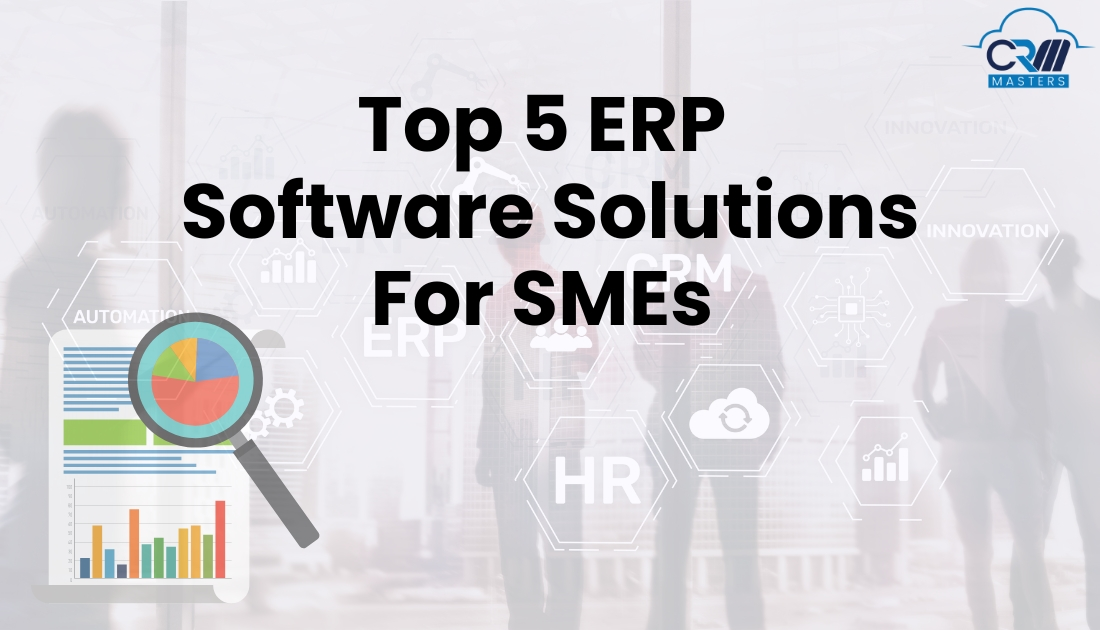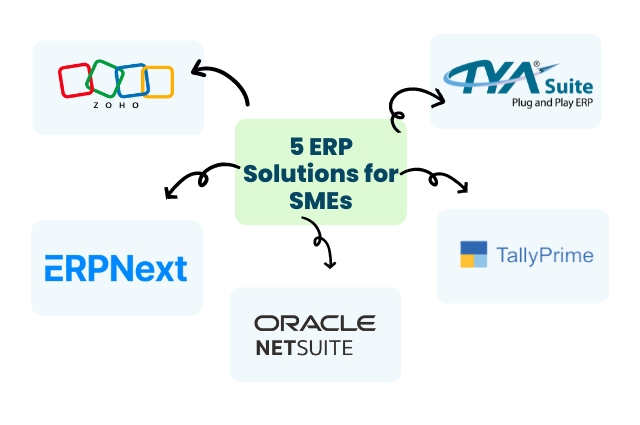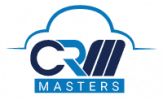
Top 5 ERP Solutions for SMEs
Small and medium-sized businesses (SMEs) require all the assistance they can get to be successful, productive, and well-organized in the cut-throat business world. Software for enterprise resource planning, or ERP, can help with this. ERP systems integrate numerous divisions and operations onto a single platform, acting as the company’s central nervous system.
Imagine having one location where you could access all of your important company data, including sales, customer relationship management (CRM), accounting, and inventory. This is an ERP system’s power. It facilitates communication, simplifies processes, and gives you the ability to make data-driven decisions for expansion.
However, picking the best ERP software solution for your SME might be difficult with so many options available.
How ERP Software Can Help SMEs?
Imagine ERP as a central hub that connects all the crucial aspects of your business – accounting, inventory, sales, human resources, and more. Think of it as a single platform where everyone in your company has access to the same real-time data. ERP software also helps in creating connections across departments, which speeds up data flow and decision-making overall.
5 ERP Solutions for SMEs

1. ERPNext:
- An Open-Source Powerhouse: ERPNext is a unique option in the ERP world – it’s completely open-source! This means you have access to the source code, allowing for customization and integration with other tools.
- Scalability for Growth: ERPNext caters to a wide range of businesses, from startups to established SMEs. It scales with your needs, so you won’t outgrow the system as your business expands.
- Focus on User-Friendliness: Unlike some complex ERP solutions, ERPNext boasts a user-friendly interface that’s easy to learn and navigate, even for non-technical users.
- Modular Approach: ERPNext offers a modular approach, allowing you to choose the functionalities you need. This helps keep costs down as you only pay for the features you use.
- Potential Drawbacks: While open-source has its benefits, it also means you might need additional resources for customization or support compared to some closed-source options.
2. Zoho ERP
- Simple to Use: Zoho provides a drag-and-drop interface which results in faster application.
- Flexibility at its Best: Businesses can customize the application by integrating third-party applications and developing custom applications with Zoho CRM Partners like CRM Masters.
- Custom Applications: Using Zoho CRM, companies can create custom applications that meet their specific organizational requirements while leveraging the power of Zoho.
- Security: Using Zoho ERP, you will always have access to your data, whether you are onsite or offsite. You will also have backups of your data for peace of mind.
- 24/7 Support: CRM Masters Zoho developers can ensure that businesses have access to the latest news and updates, ensuring that their ERP system is consistently supported.
Also Read: ERP vs CRM : Comparison & Benefits
3. TallyPrime:
- A Familiar Face in India: TallyPrime is a popular choice for Indian SMEs, known for its compliance with Indian accounting standards.
- Accounting at its Core: TallyPrime excels in accounting functionalities, offering features like invoicing, bill payments, and comprehensive financial reporting.
- Inventory Management Capabilities: While not as in-depth as GoFrugal, TallyPrime offers decent inventory management tools for tracking stock levels and generating purchase orders.
- Focus on Simplicity: This ERP solution is known for its user-friendly interface and ease of use, making it a good option for businesses with limited technical expertise.
- Limited Scalability: TallyPrime might not be the best fit for SMEs with plans for significant growth due to potential scalability limitations.
4. TYASuite:
- Cloud-Based Convenience: TYASuite is a cloud-based ERP solution, offering the advantage of accessibility from anywhere with an internet connection.
- Subscription-Based Pricing: This ERP offers subscription plans, making it easier to manage costs and avoid upfront software licensing fees.
- CRM Integration: TYASuite includes built-in CRM functionalities, allowing you to manage customer interactions and sales pipelines, and track service requests.
- Scalability and Customization: TYASuite offers scalability and customization options, making it adaptable to the evolving needs of your business.
- Limited Industry Focus: TYASuite might not cater to specific industry needs as comprehensively as some of the other options on this list.
5. NetSuite:
- A Scalable Powerhouse: NetSuite is a robust ERP solution designed for larger businesses but also offers a scalable option for growing SMEs.
- Comprehensive Functionality: NetSuite offers a wide range of features, including accounting, inventory management, CRM, project management, and e-commerce integration.
- Data Analytics and Reporting: NetSuite excels in data analytics and reporting, providing valuable insights to help you make data-driven decisions.
- Strong Security Measures: NetSuite is known for its robust security measures
You May Also Like: Benefits of Salesforce Integration with ERP System
Need an Expert Advice?
ERP implementation can be a significant investment in terms of time and cost. To ensure a smooth transition and maximize the benefits of your chosen software, consider seeking expert help.
We offer comprehensive assessments to identify the best ERP solution and CRM solutions with Zoho CRM and Salesforce CRM for your business and provide practical support throughout the implementation process, and even beyond.
Feel free to contact our experts at CRM Masters.
Sweet Bonanza 1000 shining crown Shining Crown matbet Sweet Bonanza 1000 Fortune Rabbit pusulabet İmajbet













